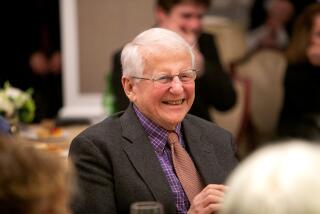Dramatist Arthur Miller and the American Polity
The 52 years of essays in this collection from the master playwright Arthur Miller present the unfolding of an acutely sensitive American consciousness, from Miller’s youth as a natural socialist in his immigrant Jewish Brooklyn to his maturity as an unmovable witness to America’s moral potential.
Miller’s finest plays--”All My Sons,” “Death of a Salesman,” “The Crucible,” “A View From the Bridge,” “The Price”--were all concerned with the choices that men and women faced in the political society of their day. So, too, are these essays. “I find myself surprised,” Miller writes in a preface, “at how many [of the essays] were involved with the political life of the times. . . . By political I don’t mean the question of who should be elected to office but rather the life of the community and its apparent direction. . . .
“To one growing up in the ‘30s, the new force in one’s awareness, as in so much of the cultural comment, was, of course, the failure of capitalism and the promise of socialism.”
Miller remarks that “the depth of that failure is all but incommunicable anymore, and the redolence of the cure even less so,” but he recalls that the “notion of the artist as activist was new and initially thrilling.” Other young socialists, like Irving Kristol and Norman Podhoretz, later turned against their youthful Marxist allegiance with the same ferocity with which they had once attached themselves to Uncle Karl.
Miller, though as anxious as they were to change the world, was not a polemicist like them but a writer and a particular kind of writer at that: a playwright at work in the commercial theater, a writer whose livelihood and whose vision depended upon his success in the popular culture. In that arena, he was both successful and true to his ideals.
His government, though, was not true to its, and shamed itself by hounding him because his beliefs--which were no more unusual than those held by most Americans--were considered “too liberal.” Frances Knight, for a generation the J. Edgar Hoover of the State Department’s Passport Division, denied him a passport for several years because it was “not in the best interest of the country.” Those who do not remember the Red-scare days of the 1950s should know that this sort of vicious nonsense was all too common then. There were “Reds,” and indeed spies, but the reaction to them grew out of proportion to their influence or their danger.
“Death of a Salesman,” with its implicit criticism of capitalism, and “All My Sons,” a play about profiteering in World War II, brought Miller under suspicion by the Red-hunter types. But it was his distinguished play “The Crucible” that brought him the most trouble. “The Crucible” was a retelling of the witch trials in Salem in 1692. Its point was obvious: Fear, paranoia and hatred, though based on unsupported claims, could kill innocent people and damage a community for the next hundred years. Even though the Red scare was winding down in 1955, the House Un-American Activities Committee got Miller’s point and demanded that he name associates in a Communist or front organization from years before. He refused and was given a one-year suspended sentence for contempt of Congress. It cost him $40,000 and a year off work.
In all these trials, Miller remained resolute but not bitter. As president of PEN International, the group devoted to writers’ freedom, he traveled to the Soviet Union, Czechoslovakia, China, Turkey and saw, as he put it, the “sin of power”: “The sin of power is not only to distort reality but to convince people that the false is true, and that what is happening is only an invention of enemies.”
“Echoes Down the Corridor” is largely but not entirely devoted to political life. Included are some charming tales of domestic life--of the garden in his New England country house, the effects of a fire in his New York home--and a prose hymn to the Brooklyn Bridge. And there are some generous assessments of other playwrights and thoughts on American theater, although his “The Theater Essays of Arthur Miller” (1996) covers his metier more thoroughly.
Having now reached the age of 85, Miller has earned the thanks of his countrymen for greatly enlarging their view of their world and themselves through his chosen medium, the commercial theater. “Echoes Down the Corridor” is a fascinating collection that, though varied in its topics, reminds us that Miller’s chief concern and great subject has always been the citizen in his world.
More to Read
The biggest entertainment stories
Get our big stories about Hollywood, film, television, music, arts, culture and more right in your inbox as soon as they publish.
You may occasionally receive promotional content from the Los Angeles Times.










